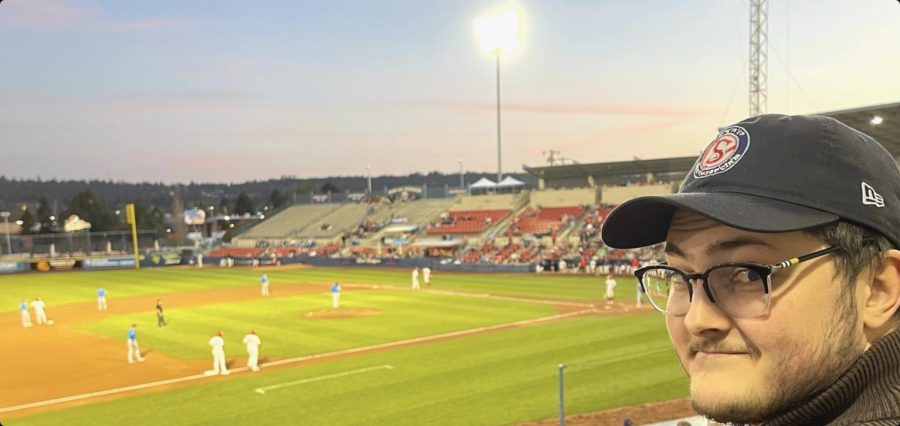My Hometown Baseball Team is Cooler Than Yours
Editor-in-Chief Andru Zodrow enjoys a Spokane Indians game.
A perfect breeze, the sun setting over the mountains, the stadium crowd roaring with excitement. The pitcher winds up and releases a fast one. Thwack. Spokane fans jump out of their seats as the ball soars out of the park. I had a great time watching my hometown team play a series against the Everett Aquasox last week.
Spokane Indians baseball is an eastern Washington institution. The team, which plays in the High-A Northwest League, has been an important part of state history since the late 1800’s when the Lilac City’s first minor league baseball institution was established.
Since then, the Indians have been woven into the fabric of Spokane culture. A great deal of the good will between the team and the community is a result of the way that the Indians engage with other city institutions. Since 2006, the team has had a strong relationship with the Spokane Tribe of Indians. For nearly two decades, the team has worked to promote the Salish language in Spokane by wearing Salish on their jerseys and placing the language throughout the team’s home Avista Stadium. According to a 2020 piece in the New York Times, the minor league institution meets with the Spokane Tribe government leadership annually, and retains the name “Spokane Indians” with tribal support.
The redband trout is a fish species which is critical to the Spokane Tribe and the biodiversity of the Spokane River. Since 2017, Spokane’s baseball team has worked with the tribe and city government to promote the protection of the river and its signature fish. The team’s latest mascot, Ribby the Redband Trout, can be seen regularly interacting with fans at home games.
The team also has a strong relationship with Spokane’s Fairchild Air Force Base. Operation Fly Together creates communal and financial support for the city’s veterans and regularly brings vets and their families out to games.
These programs and other community connections like them make Spokane’s baseball team a point of community pride beyond what happens on the diamond. However, that isn’t to discount the athletic capability of the team. A long list of Indians players have gone on to have successful careers in Major League Baseball (including Hall of Famers Stan Coveleski, Don Sutton and George “High Pockets” Kelly), and outfielder Jordan Akins even went on to play in the NFL.
For me, what makes the Indians a great team is an appreciation for the atmosphere of the games and nostalgia for the park itself. Last week, I had the pleasure of watching the team defeat Everett in a 17-8 game on April 27.
The stadium has a panoramic view of the mountains surrounding Spokane, and games take place just as the sun is setting, meaning that homers are often hit out into a beautiful early evening sky with a gorgeous backdrop. The city’s railroad tracks run right by the stadium, meaning one can often enjoy the sight of a train winding by as the game progresses. The mascots, including Ribby and my personal favorite, Otto the Spokanasaurus, have a hilarious habit of walking up to families and either dancing or just sitting down with them to enjoy the game for a few minutes. Pair that with the local food vendors who can be found at the park, and sitting with a drink and a ballpark dog makes for a great night in Spokane.
Sitting in the park, I was also struck by how many memories I have of the stadium. Growing up, my boy scout troop would attend a game and then we would be allowed to camp in the outfield. Kids running around the bases after games is a tradition which still occurs at the park, in addition to the fireworks, which can often be seen beyond the outfield.
The Spokane Indians aren’t just a baseball team, they’re a fixture of my hometown. Ask any Seattle U student who grew up in the Lilac City, and they’ll have a memory from a game to share with you. Next time you find yourself in Spokane, it’s worth swinging by Avista Stadium to catch a home game.
Editor’s Note: Andru Zodrow previously worked for a co-owner of the Spokane Indians in a capacity unrelated to the sporting organization.


